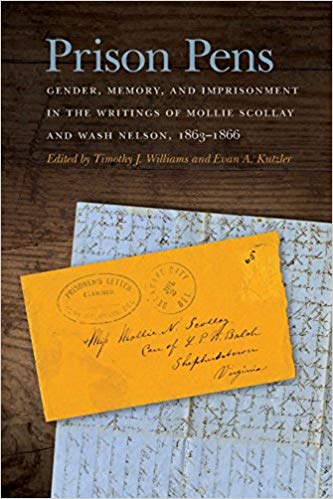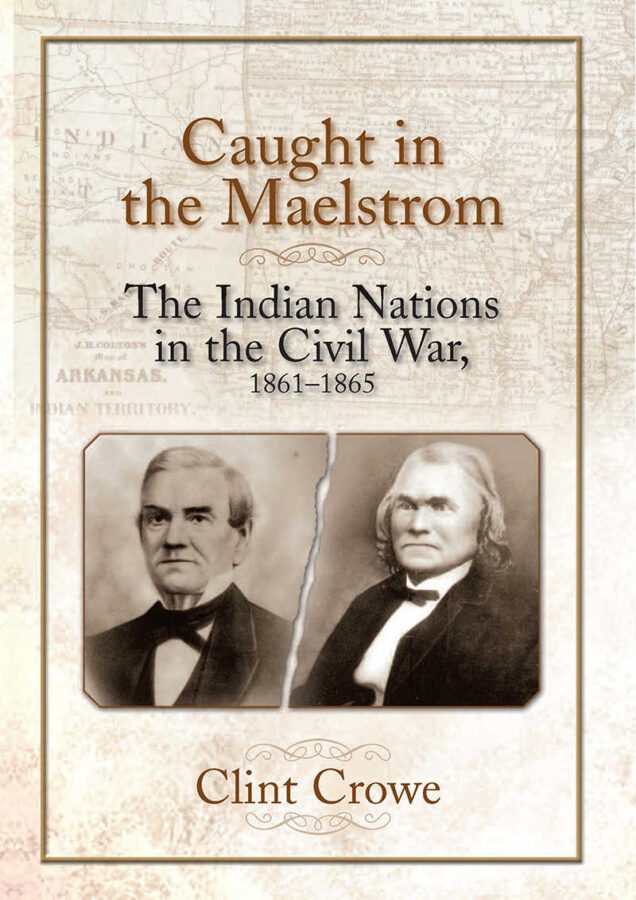Prison Pens: Gender, Memory, and Imprisonment in the Writings of Mollie Scollay and Wash Nelson, 1863-1866 edited by Timothy J. Williams and Evan A. Kutzler. University of Georgia Press, 2018. ISBN: 978-0-8203-5192-6. $24.95.
 In Prison Pens, editors Timothy J. Williams and Evan A. Kutzler present a collection of fifty-five surviving letters that George Washington Nelson, Jr. (Wash), and his fiancée Mary Scollay (Mollie) exchanged during the Civil War. In choosing to transcribe and share Wash and Mollie’s letters, Williams and Kutzler invite readers to observe the war-torn world of the Civil War South in which Wash and Mollie lived. At first glance, their story could be the story of countless others who lived through the Civil War; however, Wash’s experience as a prisoner of war and Mollie’s civilian experience on a borderland make this story unique. In particular, this edited volume reveals how two members of the Civil War generation struggled with imprisonment—including that which did not take place behind prison walls.
In Prison Pens, editors Timothy J. Williams and Evan A. Kutzler present a collection of fifty-five surviving letters that George Washington Nelson, Jr. (Wash), and his fiancée Mary Scollay (Mollie) exchanged during the Civil War. In choosing to transcribe and share Wash and Mollie’s letters, Williams and Kutzler invite readers to observe the war-torn world of the Civil War South in which Wash and Mollie lived. At first glance, their story could be the story of countless others who lived through the Civil War; however, Wash’s experience as a prisoner of war and Mollie’s civilian experience on a borderland make this story unique. In particular, this edited volume reveals how two members of the Civil War generation struggled with imprisonment—including that which did not take place behind prison walls.
Drawing on their individual strengths—Williams as a historian of Southern intellectual and cultural history, and Kutzler as a historian of Civil War prisons—the editors provide an extensive introduction that details the couple’s genealogy, their intellectual and religious backgrounds, and the history of Civil War prisons and prisoners of war. The introduction successfully familiarizes the reader with the cultural, social, and gender expectations of the time; it also provides an overview of the Civil War prisoner of war experience.
The collection begins in July 1863 with Wash as a member of General William Nelson Pendleton’s staff and Mollie as a lonely “old cat” who misses her fiancée and longs to hear from him. Opportunely, the first letter in the volume—Mollie to Wash—effectively introduces the reader to some of the main themes evident throughout the collection. She laments the poor quality of news from the battlefield, the lack of regular correspondence, and the absence of “our dear soldiers” (41). These themes of irregular post, unreliable news, uncertainty, and loneliness only intensified as the war continued.
With Wash’s capture in October 1863 and the arrival of Yankee soldiers in Mollie’s home county in Virginia, Mollie and Wash are confronted with additional challenges. Imprisoned initially at Johnson’s Island, but then at Morris Island and Fort Delaware, Wash often expressed his struggles as a Union prisoner of war. Like other prisoners, Wash longed for exchange, news from home, and for some semblance of normalcy. Wash worked to find comfort in prison, as he and his fellow prisoners shared stories and gifts, played games, and engaged in religious ceremonies.
Along with insight into the prisoner-of-war experience, the correspondence illuminates less glory-filled wartime experiences. Wash and Mollie often discussed missing or delayed letters, the invasion of privacy as prison inspectors censored correspondence, and the trouble of maintaining a relationship under such circumstances. At one point, Mollie had not heard from Wash in five months (82). Wash expressed his fear that Mollie would not recognize him, or love him, anymore, because he had become “so old looking” during captivity. This statement reveals the anxiety that Wash, and potentially other prisoners of war, felt upon release. Would their loved ones still respect and love them, despite their capture and imprisonment? What did imprisonment mean for young white males in the postwar South? To facilitate further discussion of these themes and questions, Williams and Kutzler close the volume with Wash’s 1866 memoir. Although less than twenty pages, the memoir, when juxtaposed with his letters, sheds light on Wash’s changing memory of his prison experiences and his identity as a Confederate veteran.
The reviewer finds little fault with the collection, but one minor issue is the emphasis on Wash’s prisoner of war experience. Indeed, the reality of being a prisoner of war is not to be diminished, but Williams and Kutzler missed the opportunity to examine the metaphorical “prison pens” of Wash and Mollie within Southern culture—or even Mollie’s physical confinement between Union and Confederate lines. The editors briefly mention these realities in their introduction, but fail to analyze them further. Nevertheless, readers can easily exploit this slight shortcoming, using the collection as a springboard for future research or classroom discussion. In particular, Williams and Kutzler’s detailed introduction and chapter summaries, as well as an innovative digital component, make this collection ideal for the classroom. Williams and Kutzler designed the website (https://blogs.uoregon.edu/prisonpens/) with teachers and students in mind and included an interactive map, additional letters, and lesson plans.
This reviewer is sure that professional historians will find the collection, and the supplementary website, to be useful—and fun, too!
Angela M. Riotto is an historian at the Army University Press.
